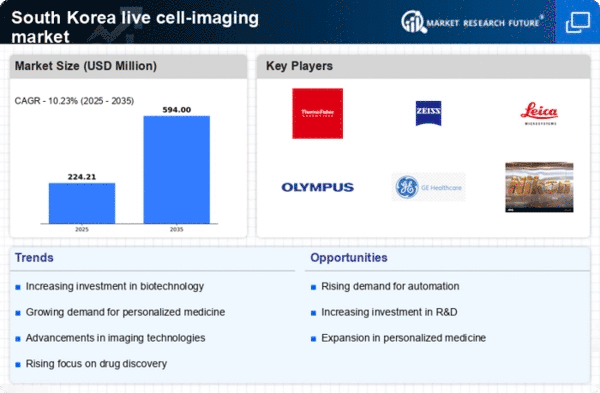Rising Demand for Drug Discovery
The live cell-imaging market in South Korea is experiencing a surge in demand driven by the increasing need for innovative drug discovery processes. Pharmaceutical companies are increasingly adopting live cell imaging techniques to enhance their research capabilities. This technology allows for real-time observation of cellular processes, which is crucial for understanding drug interactions and efficacy. The market is projected to grow at a CAGR of approximately 10% over the next five years, reflecting the industry's shift towards more efficient and effective drug development methodologies. As South Korea positions itself as a hub for biopharmaceutical research, the live cell-imaging market is likely to benefit significantly from this trend.
Increased Focus on Cancer Research
The live cell-imaging market is significantly influenced by the heightened focus on cancer research in South Korea. With cancer being one of the leading causes of mortality, there is an urgent need for advanced research methodologies. Live cell imaging provides critical insights into tumor biology and the effects of therapeutic agents on cancer cells. As research institutions and universities intensify their efforts in oncology, the demand for live cell imaging technologies is expected to rise. This focus on cancer research is likely to propel the live cell-imaging market forward, as it becomes an essential tool for understanding and combating this disease.
Growing Investment in Biotechnology
Investment in biotechnology is a key driver for the live cell-imaging market in South Korea. The government and private sectors are channeling substantial funds into biotechnological research and development. This influx of capital is fostering innovation and the adoption of advanced imaging technologies. In 2025, the biotechnology sector in South Korea is expected to reach a valuation of over $10 billion, with a significant portion allocated to live cell imaging solutions. This trend indicates a robust growth trajectory for the live cell-imaging market, as researchers seek to leverage these technologies for groundbreaking discoveries.
Advancements in Imaging Technologies
Technological advancements in imaging modalities are propelling the live cell-imaging market in South Korea. Innovations such as super-resolution microscopy and high-content screening are enhancing the capabilities of live cell imaging. These advancements allow researchers to visualize cellular processes with unprecedented clarity and detail. As a result, the adoption of these technologies is increasing among academic and industrial researchers alike. The live cell-imaging market is projected to benefit from these advancements, as they enable more sophisticated experiments and contribute to a deeper understanding of cellular dynamics.
Collaboration Between Academia and Industry
Collaboration between academic institutions and industry players is a significant driver of the live cell-imaging market in South Korea. Partnerships are fostering the exchange of knowledge and resources, leading to the development of innovative imaging solutions. These collaborations often result in the commercialization of research findings, which can accelerate the adoption of live cell imaging technologies. As more universities and research centers engage with biotech companies, the live cell-imaging market is likely to see increased growth, driven by the demand for cutting-edge imaging techniques that support various research initiatives.
















